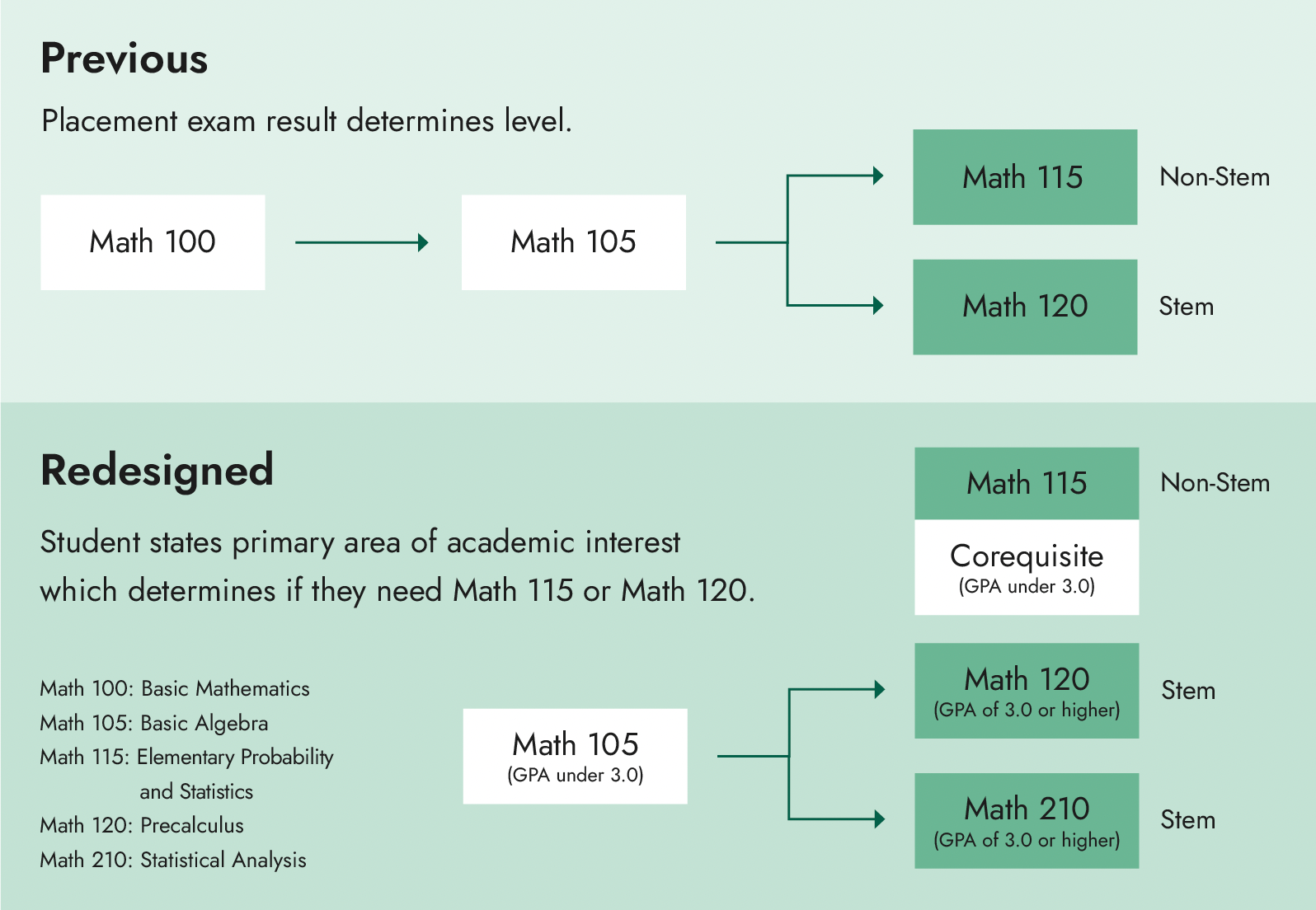
Placement Reform Leads to More College-Level Math Success at Manchester University
Dive into the details of Manchester University’s math program transformation—complete with actionable insights, methodology, and outcomes.
The Situation
Manchester University is a small liberal arts university in Indiana with traditional college aged, residential students. Like other colleges, the university had challenges with their developmental math program. Prior to fall 2022, incoming students took an in-house placement test and were placed into one of four math courses depending on test outcome and projected major (See flow chart that follows). Math instructors noticed some potential issues with the two developmental math courses, MATH 100 (Basic Mathematics) and MATH 105 (Basic Algebra), that were confirmed with data from the college’s dashboard.
- Students were getting stuck in the developmental courses. Historically, 27% of students received D, F, or W from developmental course MATH 105.
- Four (4) of 30 students with a DFW in MATH 105 in Fall ‘21 (13%) left the university immediately following that semester even though their program allowed time to successfully complete the course in the future.
- A high proportion of students of color were placed into developmental courses, rather than the non-developmental MATH 115 (Elementary Probability and Statistics) or MATH 120 (Precalculus).
The college realized they needed to make changes to their math placement process and developmental courses to promote success for all students.
“Retention matters... if we can retain five students, we’ve paid for the work.” Celia Cook-Huffman, VP for Academic Affairs
The Redesign Process
In the Spring of 2021, Almy Education began working with Manchester University, providing the external voice and perspective they needed to make lasting and positive change with their math program. Throughout the calendar year, Almy Education engaged with a cross-campus team to implement new methods for placement, scheduling, and advising for incoming students. In the spring and summer of 2022, Kathy Almy worked specifically with math faculty to roll out the redesigned developmental and corequisite math courses in fall 2022.
Manchester University Math Flowcharts

Changes Implemented Fall 2022
- Developmental course MATH 100 (Basic Mathematics) was removed as an option
- HS GPA and planned study area used to place students, rather than placement test
- STEM major students with a low high school GPA take MATH 105 (Basic Algebra)
- STEM majors with a high GPA take MATH 120 (Precalculus) or MATH 210 (Statistical Analysis)
- Non-STEM majors take MATH 115 (Elementary Probability and Statistics) with or without a corequisite, depending on their high school GPA
- Improved pedagogy in MATH 105 with increased active and contextualized learning
- Corequisite MATH 116 (Algebra Review for Statistics) added to some MATH 115 sections. Students with a high school GPA < 2.7 are required to take both MATH 115 and MATH 116
- Instilled a culture of using data dashboard in PowerBI to drive lasting positive change
Outcomes
- Using HS GPA rather than placement test resulted in fewer students in developmental course MATH 105 and more students taking college level MATH 115 (see table)
- Despite having more students in MATH 115 (Elementary Probability and Statistics), the pass rate was not affected (78.9% historically vs 78.3% in fall 2022)(see table)
- Pedagogical changes implemented in MATH 105 may have contributed to a higher pass rate
Table I: Comparing fall semesters before and after the change

With the implemented changes in placement, more students were admitted into college level Math 115, but they were still successful!
Lasting Positive Changes
A culture of continuous improvement guided by data has been built within the university. Data showed that the average HS GPA of students with a DFW in MATH 115 in Spring 2023 was 3.2 as opposed to 3.6 for those with A, B, or C. Therefore, for Fall 2023, the MATH 115 corequisite GPA will be raised from 2.7 to 3.0 to offer more support to students who need it and provide a consistent GPA cutoff for advising.
The university’s Power BI data dashboard will be monitored closely. Course placement and outcomes for students in developmental courses and for students of color will be tracked to identify any potential issues.
Because of the positive results with the redesigned math program, the university is having conversations about using contextualized learning and corequisites for other disciplines and courses, like chemistry.
“Kathy is particularly adept at being able to say ‘this is what we know from the research...’ I don’t think there was a topic or moment when Kathy or the team didn’t get it. It was ‘we’ve had experience with that.’ That depth of experience and knowledge was incredibly helpful.” Jessica Moreno, Dean for Academic Support
The Almy Education Approach
- Use of a cross-functional team to ensure implementation of changes.
- Continued refocus on the goal of supporting students with appropriate timelines
- Personalized support to fit the institution’s culture and unique students
- Training for faculty to utilize research-based pedagogies in the classroom
- Use of student data to identify what works and what needs to be modified
- Platform of support to make lasting positive change happen
What would you say to people who may consider working with Almy Education?
“Do it sooner rather than later!” Celia Cook-Huffman, VP for Academic Affairs | Manchester University


Gateway Success Starts Here
Almy Education is the only gateway course consultancy that combines proven methodology with hands-on 'done with you' implementation support, led by current and former faculty who understand both systemic change management and classroom realities.



